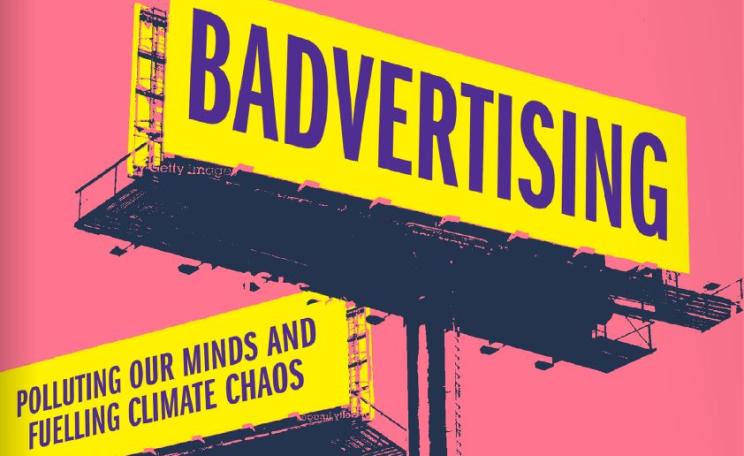It sickens me to see the beauty of sport corrupted and cheapened by brands whose business models are demonstrably at odds with the interests of all sports fans.
Tobacco companies once exploited sport to promote smoking. Big Tobacco fed off the cultural capital of large sports audiences and ‘sportswashed’ its image through the association of cigarettes with healthy activity, using adverts and sponsorship.
Ultimately, public health campaigners won and tobacco ads were banned. Is it time to do the same for major climate polluters who today use sport as a billboard to promote high carbon products and lifestyles?
The Merriam-Webster dictionary included ‘greenwashing’ in its lexicon this month. Greenwash, which can be used as both a noun and a verb, describes “the act or practice of making a product, policy, activity, etc. appear to be more environmentally friendly or less environmentally damaging than it really is.”
Laughable
The timing couldn’t be more apt. In just over 50 days, the Men’s FIFA World Cup in Qatar will kick off and, with it, greenwashing will reach new heights.
The tournament has been dubbed 'the first carbon neutral’ World Cup, despite these claims resting on highly questionable carbon accounting and unreliable offsetting mechanisms.
Then there are the tournament sponsors, where an unholy trinity of climate-wrecking companies poke further holes in the tournament’s carbon neutrality claims. Qatar Energy, Qatar Airways, and Hyundai take equal pole position as tournament sponsors, even though none have credible decarbonisation plans.
In fact, Qatar Energy is a major operator for the vast North Dome gas field that stretches from Qatar to Iran - a reserve so large it contains nearly as much gas as all current recoverable gas fields combined and has subsequently been labelled as a ‘carbon bomb’.
The main sponsor of the first self-proclaimed ‘fully carbon neutral’ World Cup lighting the fuse of one of the newest and largest ‘carbon bombs’ in the world is laughable, but the joke is lost because greenwash and sportswash are so pervasive throughout international sport.
Fracking
A 2021 report by climate campaign group Badvertising found 258 high-carbon sponsorship deals across 13 different sports, ranging from fossil fuel firms like INEOS and Santos, to SUV manufacturers like Toyota. By far the most polluted sport was football.
It sickens me to see the beauty of sport corrupted and cheapened by brands whose business models are demonstrably at odds with the interests of all sports fans.
In an attempt to halt the spread of greenwash and sportswash in sport, this year the Badvertising campaign and Rapid Transition Alliance launched the Bad Sport Awards 2022 to call out big polluters and the sports organisations that ally with them.
Picked by a panel of expert judges, including an Olympic gold medallist and notable climate scientist, this year's overall winner - the ultimate Bad Sport - was the Men’s FIFA World Cup in Qatar for the reasons outlined above.
The other award categories shed light on more examples of egregious greenwash and sportswash. For instance, the ‘Taking People for a Ride’ award was won by INEOS for their continued use of professional cycling to launder their reputation with the INEOS Grenadiers.
Hijacking one of humanity’s most effective low carbon transport options, while pushing for new fracking licences in the UK, and not to mention marketing a new SUV, the Grenadier, to bolster their public image is a perfect illustration of sportswash.
Faux-green
For the ‘Own Goal’ award, which explores the most glaring failures of corporate sustainability initiatives, Manchester City F.C’s water bottle for air miles recycling exchange scheme took the top prize.
The ‘Skating on Thin Ice’ award, which draws attention to greenwash and sports within winter sports, was won by the NHL’s Edmonton Oilers team, who continue to run the Oilfield Network for businesses and suppliers active in the Canadian fossil fuel industry.
As Award judge, Etienne Stott MBE, Olympic Gold medalist and environmental campaigner, said: “Sport has the power to change lives and reach into people's hearts, firing their imaginations.
"It therefore sickens me to see the beauty of sport corrupted and cheapened by brands whose business models are demonstrably at odds with the interests of all sports fans, and in fact all life on earth.”
While judge, Bill McGuire, professor emeritus of Geophysical & Climate Hazards at UCL, author of Hothouse Earth: an Inhabitant's Guide, and award judge, said: "The short list for this year's Bad Sports awards highlights an appalling litany of faux-green nonsense and blatant sportswash.”
Flooding
Targeting sports makes sense for these Big Polluters and their advertising agencies - and that’s why they must be called out.
Sport has a unique ability to reach billions worldwide on a regular basis and its clubs and tournaments have values, stories, and reputational legacies that brands can easily piggy-back on with minimal public scrutiny.
Sport also offers advertisers and sponsors the benefit of being associated with healthy activity, which is especially ironic when the air pollution caused by cars, planes and the burning of fossil fuels is so damaging to the health of athletes and fans alike.
The positive emotional connotations associated with the spectacle of sport is co-opted by companies with chequered pasts through advertising and commercial partnerships that allow them to launder their reputations. Scientific studies show that this practice works.
Sport giving a platform to Big Polluters has the feel of a Shakespearian tragedy when you consider sport’s vulnerability in the face of climate change. Over the next three decades, one quarter of English league football grounds will be at risk from flooding every season, while one in three British Open golf courses will be subsumed by rising sea levels.
Legacies
Snowsports, which are acutely susceptible to rising global temperatures, may become a thing of the past altogether. The most recent Beijing Winter Olympic Games relied entirely on artificial snow.
To add insult to injury, the 2021 Games boasted Air China, Toyota, the Chinese National Petroleum Corporation, and Chinese oil and gas giant Sinopec as sponsors.
Some will ask “so what?”. The financialization of international sport has created a billion pound advertising sub-industry, with many professional sports clubs now reliant upon commercial revenues to improve their facilities and teams.
But following this view requires a complete abandonment of responsibility from sports’ governing bodies. Sport has a duty to protect the athletes that play it, the fans that make it what it is, and the environments that enable it to be played - both now and in the future.
Major sports events like World Cups and Olympics are fond of talking up the ‘legacy’ they leave behind, it's one of the major aspects when cities and countries bid to host such mega events. Yet, at the moment, one of the biggest legacies the World Cup is set to contribute to is an unlivable, heating climate.
Unparalleled
This means sport must stop giving a platform to companies that are disproportionately responsible for driving the climate crisis and polluting our air, land, and sea. Cultural institutions like the National Portrait Gallery and the Scottish Ballet have successfully turned their backs on fossil fuel sponsors after powerful grassroots campaigns.
Towns, cities, and even whole countries are getting in on the action, implementing high-carbon advertising bans on climate grounds. It is only a matter of time before high-carbon sponsorship deals become a reputational hazard that sports clubs and tournaments can no longer ignore.
Anna Jonsson of New Weather Sweden, a Bad Sports Award judge, said: “The Bad Sport Awards highlight how high-carbon sponsorship in sport is as pervasive as it is harmful. Sports organisations, and its governing bodies, must review their own sponsorship guidelines in light of the climate crisis and immediately kick-out Big Polluters.”
We can hope that the World Cup in Qatar acts as a line in the sand for greenwashing and high-carbon sponsorship in sport, but there’s a real risk that it will become further normalised and institutionalised.
Sport has an unparalleled power to reach billions on matters of climate, and its values of teamwork, leadership, and a reluctance to cheat are exactly what need to be harnessed in the fight against climate change.
These Authors
Freddie Daley, of the Cool Down – sport for climate action network, a network of sports organisations calling for climate action in and through sport
Andrew Simms is co-director of the New Weather Institute, coordinator of the Rapid Transition Alliance, an author new and green economics and co-author of the original Green New Deal. He is on twitter at @AndrewSimms_uk.







